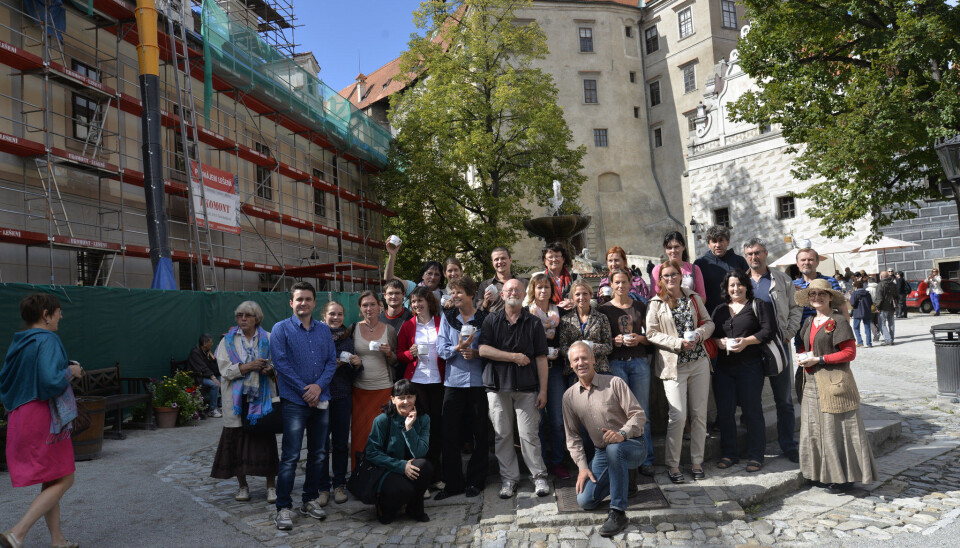This article was produced and financed by Diku - The Norwegian Agency for International Cooperation and Quality Enhancement in Higher Education

Entrepreneurs must save the countryside
Norwegian and Czech scientists are collaborating to get more people to stay in the countryside. That's why they organized courses for entrepreneurship. "It's all about 'forcing' people to see new opportunities," says one of the researchers.
Jiří Dlouhý is a lecturer at the Environment Center at Charles University in Prague, one of the oldest educational institutions in Europe. He is also the Czech coordinator for a recently concluded EEA collaboration with the Norwegian University College for Agriculture and Rural Development (HLB).
The objective of this collaboration was to develop and provide courses in social entrepreneurship and rural development.
Forces opportunities
"The fact that we have no tradition of a free market and entrepreneurship means that we have to work to change people's mentality. Courses in entrepreneurship are sorely needed here," Dlouhý emphasises.
Two rounds of courses were held in the countryside in the southern part of the Czech Republic, with Norwegian support. Each course had 25 students. Some already had a business of their own, while others dreamed of making it happen. Some were ‘ordinary’ students, others came via public agencies.
"The trend in agriculture is towards fewer and bigger enterprises that need fewer and fewer employees. So people try to find work elsewhere. Many regions are underdeveloped. This project could be helpful, because its aim is to 'force' people to see new opportunities."
Being unique
The course took place over six days, and the students could choose to take an exam worth ten credits.
"The students left the course full of new ideas. And with a network; some of them stayed in touch and have exchanged ideas after the course," says Dlouhý. He mentions a female participant from a family-run vineyard.
"They have to compete with big wine producers and need to find their own niche. She was very inspired. It's about being unique, she concluded. You have to see your own advantages and cultivate them. Could you also offer something to attract tourists? Bike rental? Horseback riding? In the Czech Republic, we have no tradition of exploiting such opportunities," says Dlouhý.
Don't see their own value
Rhys Evans agrees. He is an Associate Professor at the Norwegian University College for Agriculture and Rural Development (HLB) in addition to being the Norwegian coordinator for the EEA collaboration.
"The course is about helping to create a vibrant countryside. It covered a wide range of topics: local food, traditional craft, textiles. Then comes the big question: How can we make this relevant and interesting in the 21st century?"
Sustainable development is precisely about developing something of real value, in Evans’ opinion. Or also: to actually see the value.
"Often people don't see the value of what they have to offer. During the course, we raised topics such as urban demand for rural products. And what is known as “repurposing”, meaning to change known products’ usage. Such as the traditional family vineyard, which has now been developed to open to visitors and host various events. Or the wool producer that is now linked to the fashion industry. All development starts with knowledge," says Evans.
Dead communities
Czech statistics show that there is no large-scale migration from the countryside to the cities. The situation is rather that people live in the countryside, but work in the city.
"Firstly, this causes major transport problems. Secondly, it results in dead communities, often without shops, schools or public transport. My vision is to develop the countryside in a sustainable manner. To make country life interesting, even for young people. Small businesses are one of several important factors in this effort," says Dlouhý.
"Another important factor is education, so we need local kindergartens and schools. That is how we get educated people to create something together, such as local festivals. There is no future in just sitting in the pub," says Dlouhý.
International campus at Klepp
The course itself is over, but Dlouhý and his colleagues plan to develop it further and offer it to other interested parties.
The long-term plan is to create an international joint master’s degree in rural development. Rhys Evans envisages a collaboration between the Charles University and HLB together with one or two other educational institutions. A programme where the students first take core courses at home, before they go abroad and continue their education in English.
"We can play on each other’s strengths and give the students a broad range of choices. We can offer an excellent education, and that also allows for more and better research. International collaboration is needed to achieve excellence in research and education," says Evans.
"Today, we have very few international students on our campus here at Klepp. With an international joint degree, that situation could soon change."
Should live without support
Dlouhý says that cooperating with Norway has also contributed to his own personal professional development. The changes and challenges that the countryside faces are not that different in the two countries.
"But the way of thinking differs enormously. There's a lot of innovation and enthusiasm in Norway that we could learn from. It's also great to cooperate with a small institution such as HLB, with an efficient administration. Things probably do work more slowly at a big, traditional university such as ours."
"In future, such collaboration should ideally take place without financial support from external parties such as EEA Grants. But for now, it's not easy for us to manage without external support," Dlouhý admits.
Develops new knowledge
According to Evans, the collaboration was not about Norway flying in expertise to the Czech Republic.
"It was a mutual and complementary collaboration where we developed new knowledge together. Charles University also has great expertise, but the point is this: We can both achieve more together than on our own."
































